
With the news that the UN General Assembly has voted 138-9 to accept Palestine as a “non-member observer state,” fireworks erupted and horns honked in Gaza. Finally, Palestinians were feeling as if they were having their day in the sun.
First, Israel ended its latest attack – which some believe should be re-named “Operation Pillar of Shame” – just eight days after it began, agreeing to a ceasefire that actually offered some concessions and to continue negotiating in the coming weeks.
And then, a Palestinian state received overwhelming recognition and acceptance from virtually the entire rest of the world, with the United States, Israel and Canada now clearly alone and anachronistic. Yes, the U.S. is still able to limit that status to a symbolic one, but the writing is on the wall.
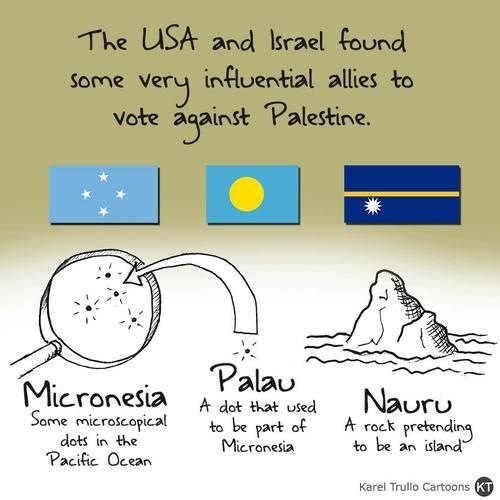
The surprise dividend from these two victories – however small — is a spirit of genuine unity not seen for years between the once-warring political parties – with Fatah cheering on Hamas while it launched a surprisingly strong show of resistance against Israeli drones and F-16s, and Hamas dropping its opposition to Fatah’s bid for UN observer status.
“A huge victory for Palestine, after a big victory for Gaza! We are all one..our time is now!” wrote one young Gazan on his Facebook wall.
Americans may be surprised to learn that Palestinians here in Gaza believe they scored a significant “win” in the most recent war with Israel. After all, the casualties were once again so very lopsided: 167 Palestinians killed and 1,269 wounded (more than three-quarters of whom were non-combatants), compared to 6 Israelis killed and 224 injured. However, the way Palestinians see it, this time – compared to the “massacre” of 2008/9 — they were able to fight back, surprising Israel and demonstrating that its aggression would come at a price.
“During the last assault (of 2008/9), we were very weak. We felt useless. When Israel finally ended its 22 days of slaughter, we got nothing but a ceasefire,” explains Shahd Abusalama, a university English student in Gaza, blogger and activist for political prisoners. “Now we are stronger. We still can’t compare to the fourth largest military in the world, but we were able to fight back more strongly this time. It ended after eight days, and we got concessions in return. It wasn’t just on (Israeli) terms but on ours too.” (I will write more later on the growing conviction here that armed resistance is the only type of protest that actually produces some measure of results…)
One of the most dramatic concessions from Israel as a result of the agreement brokered by Egypt is greater access to the “buffer zone” along Gaza’s border with Israel. The 1.5-kilometer swath of land includes more than a third of the territory’s most fertile soil, and farmers have been unable to plant their crops there – forcing them to rely on charity and NGO handouts to support their extended families. Israel shot or burned the crops of those who ventured into this “no-go zone.”
On Nov. 30, however, a week and a half after the signing of the ceasefire, I found farmers in the border area in the Khan Younis district planting wheat, tending tomatoes and even partying with shisha within sight of the Israeli watch towers. Abu Raeid Kudiyeh and his cousins, for example, own 40 dunums (9.8 acres) along the border, but hadn’t been able to farm it for seven years. Since the ceasefire, he now has cultivated his property up to 100 meters from the border fence – and would have gone further if soldiers in the watch tower hadn’t started firing warning shots. [Abu Raeid invited me to walk with him towards the border fence on the evening I visited. We got within 40 meters or so before the Israelis began shooting – perhaps because of the presence of an international woman.]
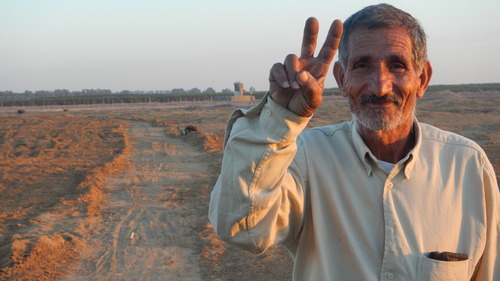
The strawberry farmers of Beit Lahia in the north are even happier. They sent their first shipment of 20 tons of strawberries to the Kerem Shalom crossing into Israel today, on the way to Europe. And for the first time, they carry a “Palestine Crops” logo.
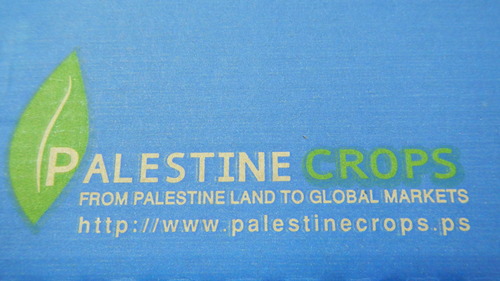
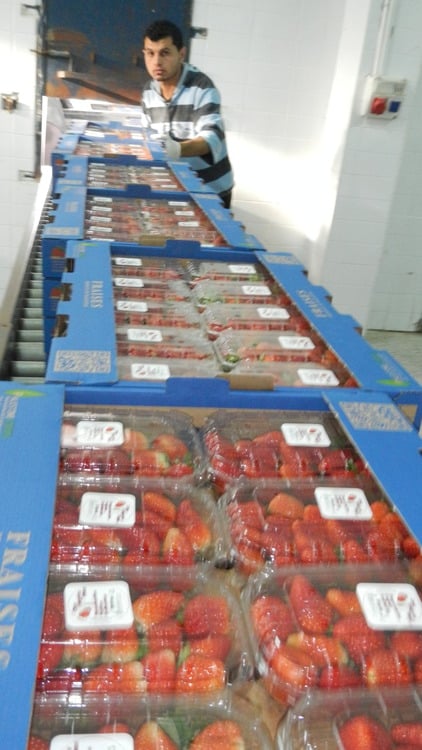
Despite this plucky spirit, however, the news is not all good. According to the Ma’an news service, two Palestinians have been killed and at least 40 injured after entering the buffer zone during the days after the ceasefire was announced on Nov. 21. Hamas has shown admirable restraint, and rather than escalating the tit for tat, registered a complaint with its Egyptian interlocutors.
Fishermen are facing far greater challenges. Although Israel has reportedly agreed to allow boats to sail six miles out instead of just three, Ma’an reports more than 30 fishermen have been detained since the ceasefire, frequently confiscating their boats and/or equipment. Some had (whether they admit it or not) attempted to sail beyond the new six-mile limit, protesting that they need to go out 12 miles to get to the good fish. Others insist they had complied with the new regulations, or say it is often hard to tell just where the new “border” lies.
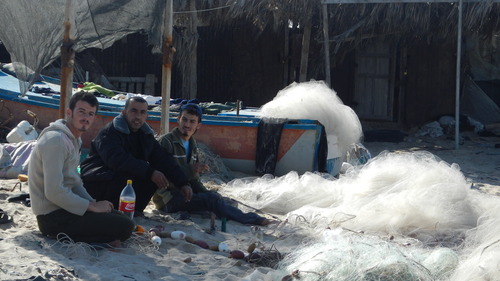 These young fishermen are afraid now to sail out past 3 miles, after being shot at by the Israelis.
These young fishermen are afraid now to sail out past 3 miles, after being shot at by the Israelis.
Mahfouz Kabariti, coordinator of the Fishermen’s Solidarity Campaign in Gaza, thinks there are a few reasons why Israel is so intent on cracking down on fishermen: 1) It helps keep the Gaza Strip dependent on Israeli imports, including frozen and farm-raised fish; 2) Detained fishermen are a good source of intelligence if they “crack” under pressure; 3) It’s a form of collective punishment; and 4) An extensive offshore gas field was discovered in 2000, and Israel wants to retain control (although it is much further out than 12 miles).
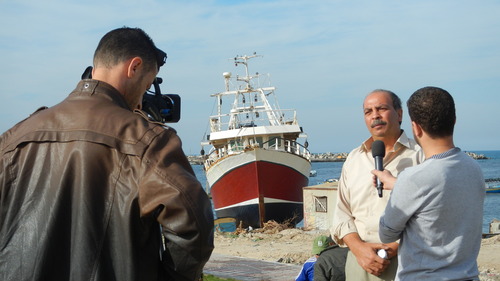 Mafouz is interviewed by Ma’an.
Mafouz is interviewed by Ma’an.
What does all of this mean for the future? Tamer Mansour, senior editor at Al Arabiya in Gaza, says that Egypt continues to bring both Hamas and Israeli officials together in talks to focus on the tunnels, exports and further lifting of restrictions on movement. Egypt wants the tunnels closed, which would mean expanding the Rafah crossing to allow exports as well as human traffic. In fact, Ma’an reported yesterday that the Hamas-led government in Gaza will sign an agreement with Egypt next week for construction materials to enter via the Rafah crossing to help rebuild after the last Israeli assault.
That’s good news on the one hand. But on the other, Mansour says it strikes fear into his heart. He suspects that Israel’s grand strategy is to push Gaza closer and closer into Egypt’s arms, while doing the same between the West Bank and Jordan. The ultimate choice Palestinians may have to make is between greater self-sufficiency in the near future, and holding out for a united Palestine.
“That could mean we would lose a Palestinian state in the true sense of the word,” says Mansour. “This is the bad side of the story. For me, I refuse this. But will we have a choice?”
Our most important fundraising appeal of the year
December is the most critical time of year for Truthout, because our nonprofit news is funded almost entirely by individual donations from readers like you. So before you navigate away, we ask that you take just a second to support Truthout with a tax-deductible donation.
This year is a little different. We are up against a far-reaching, wide-scale attack on press freedom coming from the Trump administration. 2025 was a year of frightening censorship, news industry corporate consolidation, and worsening financial conditions for progressive nonprofits across the board.
We can only resist Trump’s agenda by cultivating a strong base of support. The right-wing mediasphere is funded comfortably by billionaire owners and venture capitalist philanthropists. At Truthout, we have you.
We’ve set an ambitious target for our year-end campaign — a goal of $250,000 to keep up our fight against authoritarianism in 2026. Please take a meaningful action in this fight: make a one-time or monthly donation to Truthout before December 31. If you have the means, please dig deep.